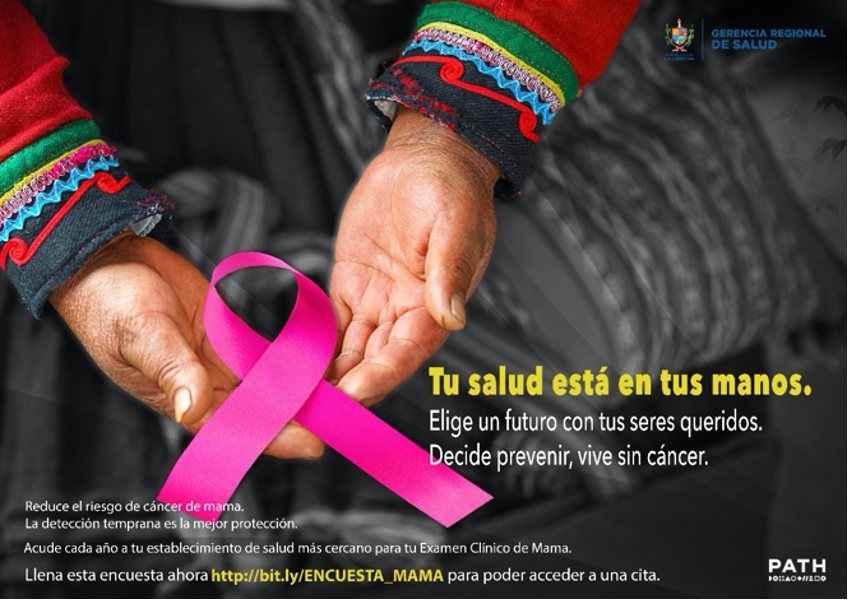Breast cancer is a leading cause of death in women worldwide. Early detection and access to treatment are the two main determinants for surviving breast cancer, but in Peru—where breast cancer accounted for 20 percent of all new cancer cases in 2018—more than half had already progressed to stage 3 or beyond.
To help diagnose these cases earlier, PATH’s breast cancer team has developed a holistic approach to guide women through detection and treatment in Peru.
“We’re partnering closely with community volunteers, professional midwives, and doctors,” says Vanesa Castillo, PATH’s regional coordinator in Trujillo, Peru. “Together, we’re leveraging new technology to increase chances of survivorship at every step of the patient journey.”
Step 1: Increase awareness and encourage seeking care early

A breast cancer awareness poster in Trujillo, Peru, developed by PATH and the Phillips Foundation. Photo: PATH.
Early detection is critical. Understanding what to look for—and how to look for it—can save a woman’s life. PATH trains community health promoters who educate women about risk factors and signs and symptoms, and encourage them to get clinical breast exams.
“The COVID-19 pandemic has created real challenges for community health promoters,” says Ines Contreras, PATH’s national coordinator in Peru. “But with the help of current technology, we’re overcoming those hurdles.”
While women are prevented from gathering in person, health promoters are using WhatsApp to deliver early detection information via short videos.
PATH also partnered with the Phillips Foundation to launch an awareness campaign on social media platforms and with printed posters in the city of Trujillo. The poster, pictured above, shares a website that women can visit to take a breast cancer risk survey and make a clinical breast exam appointment.
Step 2: Provide early detection beyond the mammogram

Vanesa Castillo, a professional midwife and PATH regional coordinator, leads clinical breast exam trainings and implementation of the digital breast cancer patient tracking system in Peru. Photo: PATH/Daniel San Martin.
Mammograms are considered the gold-standard for breast cancer detection, but in Trujillo, as in many other low-income settings, they are not easily accessible nor routine. For this reason, professional midwives—often the first point of contact for women seeking breast cancer screening or other health services—are especially important.
PATH’s breast cancer detection program in Trujillo trains midwives to perform clinical breast exams. If a midwife detects a palpable mass, they refer the patient to a specialist for triage ultrasound. If the ultrasound shows a benign cyst, then the cyst can be drained, and the patient is asked to return for follow-up in one year.
If the triage ultrasound shows a potentially cancerous mass, the doctor will perform a biopsy and send the slide to the pathology department at the regional cancer hospital. If cancerous cells are detected, the woman is referred to the regional cancer hospital for definitive diagnosis and treatment.
Step 3: Ensure women receive treatment

Breast cancer patient journey with PATH’s model. Image: PATH.
Until recently, pen-and-paper tracking systems made it difficult to ensure that diagnosed patients actually received treatment.
In 2019, midwife and Trujillo Cancer Coordinator Rosa Gonzalez partnered with PATH to transform the old patient tracking process into a more sophisticated digital tracking system.
PATH, in collaboration with La Libertad Regional Health Administration (the local arm of Peru’s Ministry of Health), the Trujillo Health Network, and Hispanic American Health Link, customized the open-source DHIS2 information tracking system to develop a platform for tracking breast cancer patients in real time.
Now, care providers at all levels—from primary care midwives to doctors at hospitals and pathology specialists at the cancer institute—can enter key data points into one system that tracks patients from diagnosis to treatment.
The DHIS2 Breast Cancer Tracking Pilot, launched in 14 health establishments in Trujillo in October 2020, will guide women on their journey to breast cancer survivorship.
“We are eager to scale this model in low-resource settings in other regions of Latin America, Africa, and Asia,” says Silvia de Sanjose, director of women’s cancers at PATH. “Detecting breast cancer early will decrease the length and intensity of treatment and will improve outcomes, helping women live longer in Peru and beyond.”
PATH acknowledges the Pfizer Foundation for their generous support to the breast cancer team’s work over the past four years.
Carolyn Bain is PATH's senior program officer, breast cancer.



